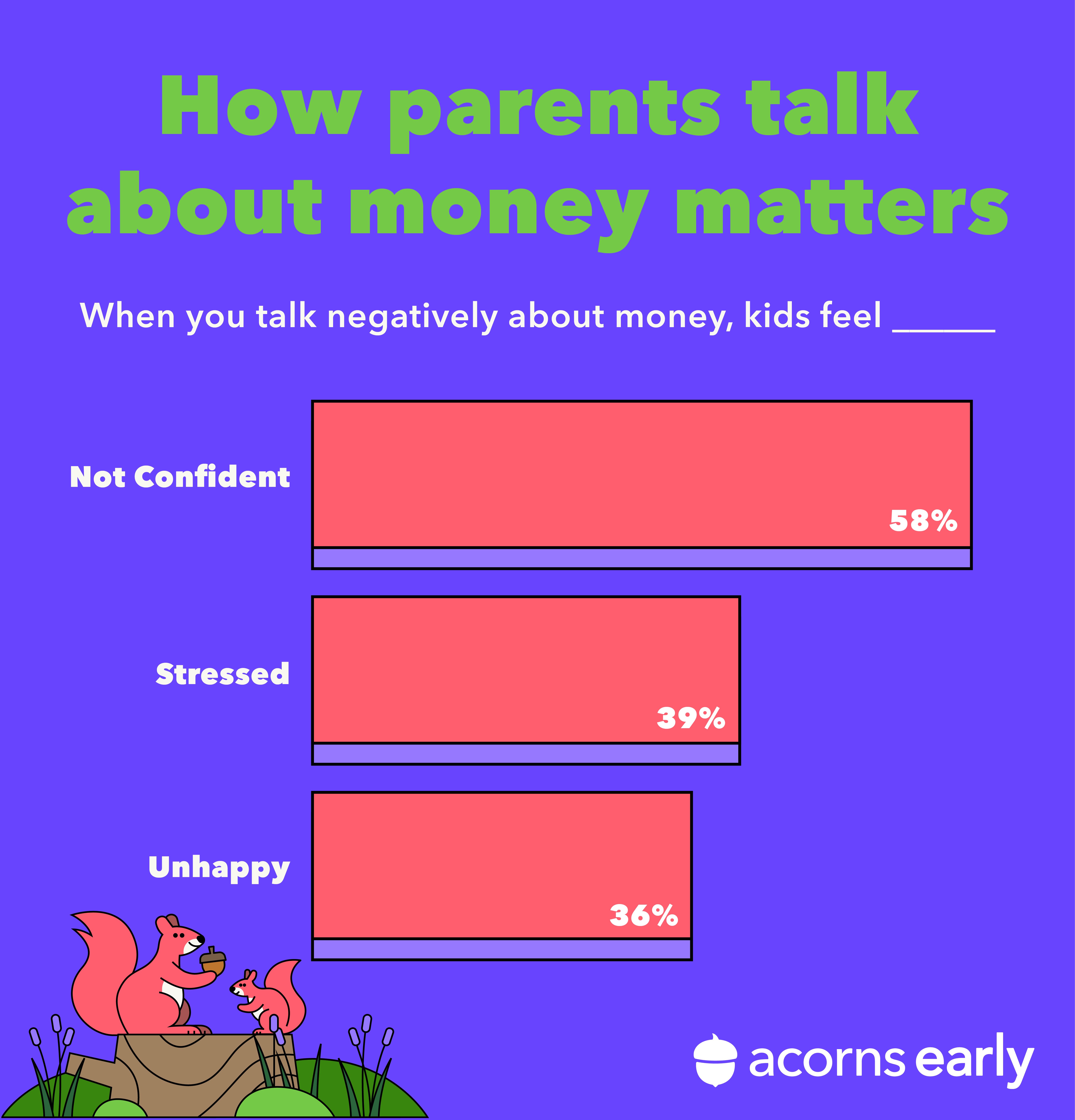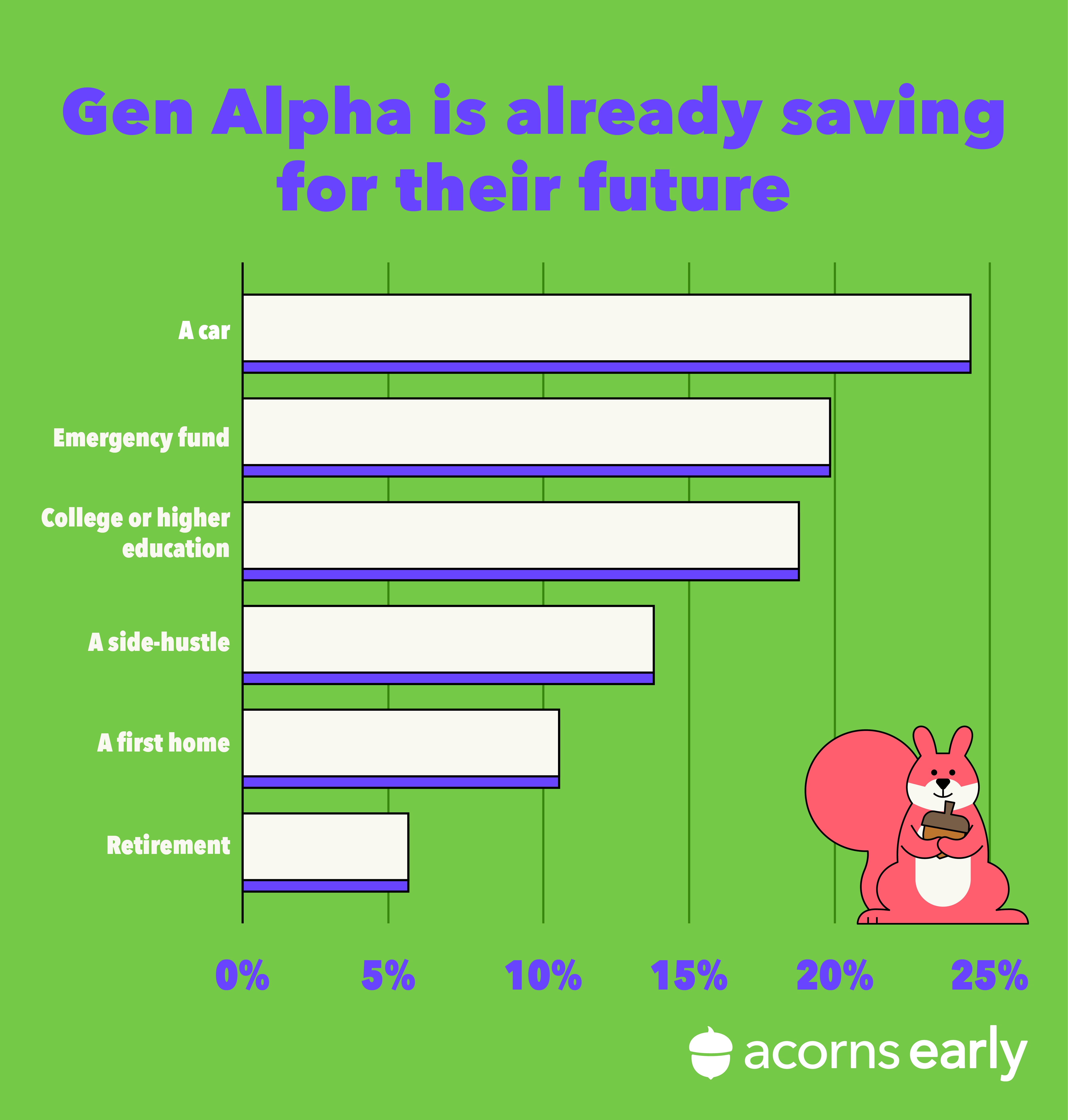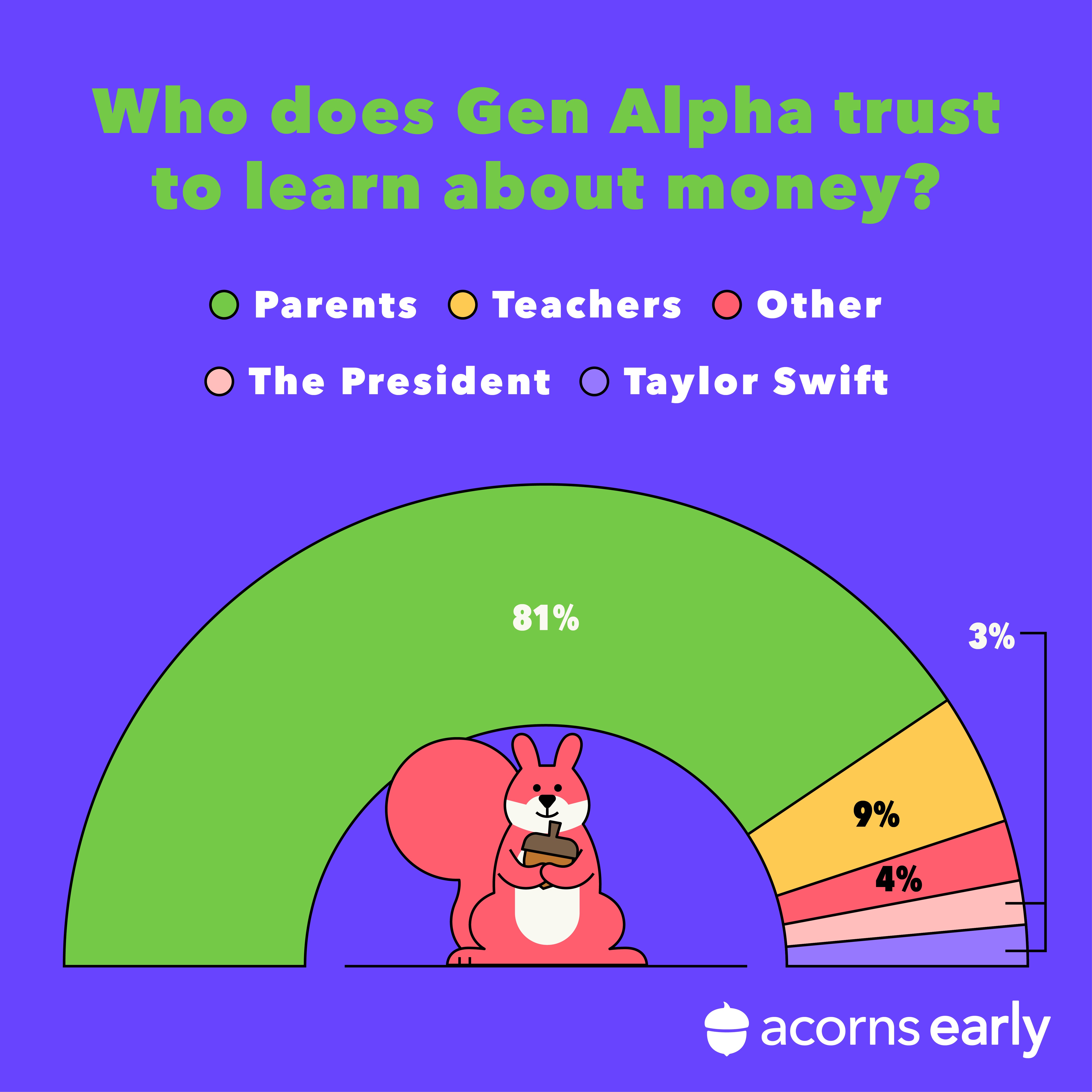Acorns Money Matters Report™ for Kids

For the first-ever Acorns Money Matters Report™ for Kids, we studied the money habits of children aged 6 to 14.
What we found was that Generation Alpha (born 2010 or later) share the same stress about money as many U.S. adults. The only difference is they’re doing something about their financial anxiety.
Unlike any generation before, they’re planning ahead for every money milestone, with some even growing the seeds for retirement.
Here's what they're doing and how parents can help.
Stressed parents raise stressed children
It’s encouraging that children are already thinking about their financial futures. But that forward-thinking attitude wasn’t born out of nothing.
Many have seen their parents struggle to get a handle on their finances. It’s gotten so bad that nearly a quarter of American adults admit that their financial situation could lead to homelessness, according to findings from our Money Matters Report™ earlier this year.
So it’s no surprise that children are stressed — because, well, their parents are too. Among children aged 10 to 14 who associate stress with money, more than three-quarters of their parents report feeling the same way.

But money stress isn't just seen. It’s heard as well. A lot of times parents are letting those negative emotions carry over into conversations at the dinner table.
And that, according to our latest Money Matters Report™ for Kids, influences children’s disposition to money. Basically, kids are mirroring their parents’ attitudes toward money. If parents are happy and confident, their children are happy and confident. And if parents are not, their children are not either.
Kids are already thinking about their financial futures

The good news is Gen Alpha is learning from their parents' money mistakes. We found children as young as 6 years old already planning for major life purchases.
Among children ages 6-14:
- 24% are saving for a car
- 19% are saving for college or higher education
- 11% are saving for their first home
It's not about material possessions, either. Gen Alpha is also thinking about their financial security.
About 20% of kids in this generation have started saving for an emergency fund. That's impressive when you consider that earlier this year, our 2024 Money Matters Report™ found that 25% of adults don't have an emergency fund, and 46% aren't planning to start one.
Some Gen Alpha kids are even thinking longer term. A surprising 6% said retirement is already on their money bucket lists.
Parents can be financial role models

With big goals, kids need guidance, and they're not finding it from Taylor Swift or Dwayne Johnson, either. They're looking to you.
In fact, 81% of children surveyed trust their parents the most to teach them about money.
Don't worry: you don't need all the answers right away, so you can skip ordering a library of finance books.
But it's good to know where to find reliable financial information. Otherwise, your kids may turn to social media or TV for financial advice.
This is already happening when it comes to shopping — up to 37% of all children surveyed look to movies, TV, or social media for direction on where to shop and what brands to like.
As kids get older, outside influences take a stronger hold. Among 10- to 14-year-olds, 40% look to social media for guidance, a noticeable jump from the 31% of 6- to 9-year-olds who do the same.
So you need to cover all the money bases, starting with teaching kids good spending habits they’re not hearing on social media or in entertainment. The sooner you start, the sooner you can drown out the outside voices.
Let your kids practice managing money
There's only so much you can teach before kids need hands-on experience — and that requires money.
Luckily, many kids are already finding ways to earn their own money.
A whopping 69% of kids surveyed are starting or planning to start a side hustle. Their reasons for doing so varied:
-
58% see it as a way to earn extra allowance
-
31% want to save for expenses like college or driving lessons
Side hustles are clearly popular, but they're not the only way to earn money. There's also an allowance. If you're wondering, "Is my child too young?," consider this. Nearly 62% of 6-year-olds already receive an allowance, and by age 14, that number climbs to 80%.
Make allowances purposeful
When giving an allowance, make sure it's something earned, not given. Kids should connect earning money with completing regular tasks, like mowing the lawn or doing dishes.
Building this habit takes time, so pick chores they can complete consistently. Over time, this will not only make them better with money, but they'll form a positive relationship with money.
-
40% of kids who receive an allowance associate money with feeling happy, confident, and excited, compared to just 30% of kids who don't earn an allowance.
-
21% of kids who don't earn an allowance reported feeling stressed about money, compared to just 13% of kids who do.
Acorns Early can help you and your children learn by doing with a debit card, money missions, and even a weekly allowance.
Money Matters from previous years
Acorns is a financial wellness app that helps everyday people and families save and invest money for the long term. Since 2014, Acorns has grown into a global company with multiple life stage products serving the needs of kids, teens, adults and parents. Named one of TIME’s “World’s Best Brands of 2024,” Acorns has helped over 13 million people save & invest over $22 billion dollars, much of it from spare change and small amounts.
Investment advisory services offered by Acorns Advisers, LLC (“Acorns”), an SEC-registered investment advisor. Brokerage services are provided to clients of Acorns by Acorns Securities, LLC, an SEC-registered broker-dealer and member FINRA/SIPC. Acorns is not a bank. Banking services issued by Lincoln Savings Bank or nbkc bank, members FDIC. The Acorns Early card is issued by Community Federal Savings Bank, member FDIC, pursuant to license by Mastercard International. For more information, visit www.acorns.com.
About the data:
Opinium:
The 2024 Acorns Money Matters For Kids research was conducted anonymously by Opinium Research and commissioned by Acorns. This survey was not directed at Acorns customers. Any response collected from a customer was coincidental. The survey was conducted from October 4, 2024 through October 21, 2024, using Opinium Research’s nationally representative online research panel. The sample population consisted of 2,000 U.S. consumers ages 6-14, comprised of 1,056 males, 940 females, 4 nonbinary/preferred not to say and 2,000 U.S. parents of Gen Alpha ages 24-72, comprised of 615 males, 1,382 females and 3 nonbinary/preferred not to say.
The survey questionnaire was written by Acorns. "Acorns" and "Money Matters Report" are trademarks of Acorns Grow, Inc.
*Cebr:
Rounded up from $11,332,618,054.94. Cebr conducted a weighting process on anonymised Acorns Early (formerly GoHenry) member data based on 59,318 active U.S. Acorns Early (formerly GoHenry) members born since 2010 between 06/28/22 and 06/27/23, compared to the same group of members also active between 06/28/23 and 06/27/24. Weighting took place on the basis of three demographic cross-breaks: age, gender, and region. Cebr is an independent consultancy known for providing sound business advice grounded in thorough and insightful research. Since 1992, Cebr has been at the forefront of business and public interest research, offering analysis, forecasts, and strategic advice to major UK and multinational companies, financial institutions, government departments and agencies, and trade bodies.
**The total number of Gen Alpha kids and teens included in this study reflects the 2,000 6-14 year olds surveyed by Opinium and internal data from 59,318 active U.S. Acorns Early (formerly GoHenry) members born since 2010 between 06/28/22 and 06/27/23.







